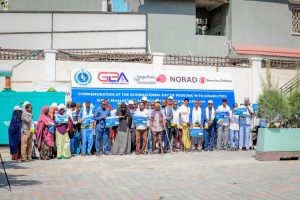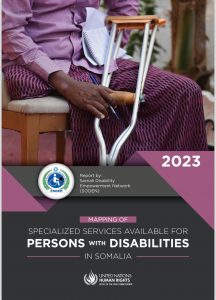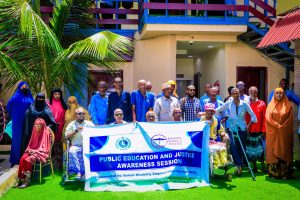Gender discrimination is one of the most common problems for all girls and women in Somalia. It is extremely rooted in the traditions and social-cultural structures of Somali society, posing a formidable barrier to women’s participation in formal decision-making processes as well as their control of economic and political resources. Even at family or community level, women have a very limited say in the decisions affecting themselves and their families. Although legal provisions were established in the 1970’s to accord equal rights to women, they had limited impact on the majority of women due to a lack of effective mechanisms to enforce them and the persistence of long-standing traditions limiting their ability to participate.
Women with disabilities have been described as being doubly marginalized on account of their disability and their gender. They may be more vulnerable to poverty and social exclusion, and often have limited social, political and economic opportunities and lack of access to basic services. Women with disabilities may also be at greater risk of sexual and physical violence and abuse. Girls with disabilities often experience discrimination, for example in education and family life.
However, to address these issues it is necessary to understand the social roles of and between women and men both with and without disabilities. The exclusion experienced by women and girls with disabilities is not simply a women issue or a women with disabilities issue, but a social issue that requires active participation of women, men, girls and boys. This can be described as a gender and development, rather than women in development, approach.
Both mainstream policies and programs and initiatives aimed specifically at people with disabilities should have a cross-cutting gender component to ensure the inclusion and empowerment of women and girls with disabilities. This is supported by Article 6 of the Convention on the Rights of Persons with Disabilities (CRPD),
This article focuses on women and girls with disabilities and highlights that they are subject to multiple discrimination. It stresses that measures shall be taken to ensure the full and equal enjoyment by them of all human rights and fundamental freedoms; and, the full development, advancement and empowerment of women.
As one of the disabled women interviewed by Amnesty International in 2015 report on Disability in Somalia said “I was 13 years old. My family decided to give me to this man, I refused and ran away. My family sent strong men after me. They caught me, tied my arms and legs and threw me in a room with the man. He beat me since the beginning. His family would say that I was disabled, that I shouldn’t complain. He beats me, slaps, kicks and throttles me…When I escape and go home, my aunt says that I am disabled and returns me back”.
Last year in 2015 I met Aisha Ahmed who is a disabled woman. She told me that she was divorced by her husband after she was admitted to the hospital because of damage to her right leg due to an explosion that happened near her house while she was a pregnant. She said, “He decided to leave me without doing anything and he said to me that he couldn’t be a partner of or live with someone who is disabled because she can’t look after my future children.” Finally, Aisha gave birth to a baby girl and now she has her baby. This abuse against people with disabilities in Somalia is a grave disadvantage and problem.
Girls and women with disability in Education
People living with disabilities, especially girls, face huge struggles in accessing education in Somalia. There are inadequate funds for the schools to install ramps for wheelchairs, transport services for those who struggle with mobility, and ‘disability-friendly’ learning resources and study spaces. There are also very few teachers who have had adequate training in how to incorporate children living with disabilities into classroom learning. Many people underestimate the capabilities of those living with disabilities and therefore don’t invest in educating children with disabilities especially girls.
The ongoing exclusion from education has meant that many adults living with disabilities remain uneducated and illiterate. This leaves many of them unable to support themselves, contribute to their households or fully participate in their communities. Many have to resort to begging, which only serves to reinforce the stigma already attached to people living with disabilities in Somalia.
Persons with disabilities in Somalia as in many other countries face numerous challenges that result in their exclusion from mainstream of society, making it difficult for them to access their fundamental social political and economic rights. Many make their way through life impoverished. Abandoned uneducated, malnourished, discriminated against, neglected and vulnerable for them, life is daily struggle to survive. Whether they life in urban centre’s or in rural areas, they share those common problems. They are largely excluded from essential services and lack protection of the family and community, and often at risk of exploitation and abuses. Factors contributing to this pathetic situation are many and varied but include poverty, unemployment social isolation, and environmental institutional attitudinal, economic barriers and Lack of awareness especially girls and women living with disability.
Practical Recommendations
- Guarantee equal access to education and other opportunities such as economic empowerment that decrease the isolation of women, men and children with disabilities reducing the social exclusion that contributes to vulnerability, violence and abuse
- Integrate sexual and reproductive health including gender-based violence programming to the DPOs service
- Ensure that information, education and communication materials and tools related to HIV, sexual and reproductive health are accessible to women, men and children with disabilities addressing their different communication needs (e.g. large prints, use of audiovisual, Braille, sign language, more pictures including images of persons with disabilities as well as pictograms, using less words and more simplified language);
- Directly involve persons with disabilities/their organizations, especially organizations of women and girls with disabilities in the design, implementation, monitoring and evaluation of prevention and response services.
- Ensure that women, men and children with disabilities have access to information on their rights – particularly those who do not have access to mainstream gender-based violence and protection programming – so that they can identify, prevent and act upon a violation against them – ensuring that women and children are aware of those entitlements
- Ensure accountability of international structures, government and civil society in preventing and responding to violence based on sex, age and disability against all women and girls by enforcing the CEDAW and CRPD as well as national laws and policies prohibiting any form of violence against all women and girls, including persons with disabilities .
Mohamed A Farah
Founder of Somali Disability Empowerment Network (SODEN)





